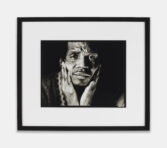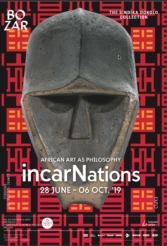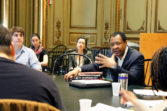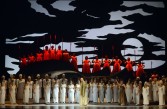
(…) Rashid Johnson’s photographs are arenas of action, places where people come together and cultures comingle. Seeing in the Dark and the abstractions are deeply personal works. However different they might seem, they both explore the conflicts and convergences of the artist’s race and class, and the dual spaces he inhabits as a middle class Black American. The portraits are encounters that help him to test, and sometimes bridge, the social divides within his life and his community; the abstractions, on the other hand, are an almost Utopian space where the bedrocks of two cultures can co-exist and flourish. Together these two series, made when the artist was very young, laid the foundation for all of the mature explorations to come.





